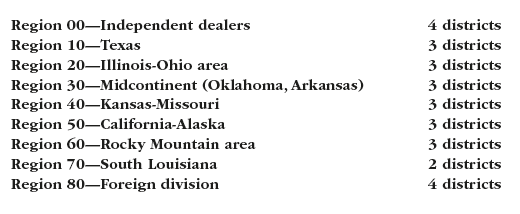Magnet Covet Barium Corporation (Magcobar), a producer of oil drilling mud, was having trouble with the performance of its Midwest region. The products sold by Magcobar were used by oil producers to aid in drilling oil wells. The line consisted of over twenty-five mud products. On its role of customers were such big corporations as Exxon, Gulf, Texaco, and Mobil. It also sold its products to smaller companies, such as Hunt Oil, Sunray DX, Adams Petroleum Corporation, and even to smaller operators, such as drilling specialty firms located close to a concentration of oil fields.
Magcobar had experienced a steady growth in its twenty-five-year history. Its products were sold nationally as well as in many foreign countries. The American market was organized into regions, and the foreign market was under a separate import-export division. The basis used for dividing the United States into regions was the concentration of oil production in various areas. For example, there was a large amount of oil-producing activity in southern Louisiana, and this area constituted the company’s largest region from the standpoint of sales, warehouses, and inventories. The following table lists the company’s nine regions and indicates the general coverage of each:

These regions and districts covered the major areas where mud products were needed because drilling activities were being carried on there. Each region was divided into districts, and within each district the company maintained its own warehouses or leased space in public warehouses. The division into districts was based upon the number of ultimate users of the product, expected sales, and the number of warehouses needed to cover the area. A regional manager was in charge of each region. The district managers, who were responsible to the regional managers, were in charge of sales engineers and warehousers. The sales engineers advised customers on the right type of Magcobar product needed to drill each oil well successfully and without complications. Since these requirements varied from well to well, the sales engineers found it necessary to visit the drilling sites frequently.
The warehouses were the distribution points that maintained stocks of mud for quick delivery to users. Magcobar management believed adequate warehouse facilities were a very important element in the success of their business. Transporting their product long distances overland resulted in very high transportation costs. It was necessary to locate within a short distance of the concentration of the oilfields. The actual number of warehouses within a district or region depended upon the concentration of oil activity. Each warehouse kept an adequate inventory on hand to supply the needs of customers immediately—usually all twenty-five products were stocked, in varying quantities. The company considered an inventory turnover of four to be average. The inventory section of the accounting department at the home office kept monthly records of stock on hand in each region, district, and warehouse. The warehouses sent in monthly stock reports of material on hand and monthly records of sales receipts. Each region, district, and warehouse was visited at least once a year by an auditor, who checked inventory on hand against the records at the home office.
At the end of the current fiscal year, the company was faced with a regional problem. Region 40, the Kansas-Missouri area, was incurring high costs and disproportionately low sales. However, inventory turnover in the region was above average. Magcobar was servicing many accounts in the area but was not making a very good profit. In previous years the region had done well in inventory turnover, sales, and efficiency of operations. But in the past two years, sales declined to the point where operating costs in the region were not even covered. The marketing manager could not understand what was happening, because inventory turnover was still quite adequate. The company had important accounts in the region and did not want to abandon it; large capital investments were also tied up in the area. The personnel in charge of the region had been with the company for some time and were very upset about the recent trends.
In addition to the Magcobar warehouses, there were a number of independent dealers. These dealers were specialty firms, and they were supplied with mud products by Magcobar. They, in turn, sold these products to the drilling companies. These dealers made up a large part of the regional volume.
Magcobar was faced with a major decision, since management did not want to continue serving a region that was showing an inadequate contribution to profit. The sales manager felt that there were three alternative solutions: (1) they could shut down the area and write off the loss, (2) they could supply the independent dealers but shut down the company warehouses, and (3) they could merge Region 40 with another adjoining region to reduce overhead expenses. The decision required a balancing, not only of monetary factors, but of human factors as well.
Source: Richard R. Still, Edward W. Cundliff, Normal A. P Govoni, Sandeep Puri (2017), Sales and Distribution Management: Decisions, Strategies, and Cases, Pearson; Sixth edition.

I have been surfing online greater than 3 hours these days, yet I by no means discovered any interesting article like yours. It is beautiful worth sufficient for me. In my view, if all website owners and bloggers made just right content material as you probably did, the internet will be a lot more helpful than ever before.
Thankyou for helping out, wonderful info .